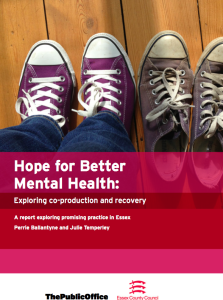NEW PUBLICATION: Hope for Better Mental Health: co-production and recovery
“Co-production is what the Recovery College is based on – the ethos runs through the whole process. We encouraged people to share, and we shared ourselves too – talking about our lives and our experiences. People lost their mental health identity and became just people. I didn’t feel like a clinician. It’s very different to what I’ve experienced in mainstream services.” (Former Manager, Recovery College)
‘’I’ve realised that I have something to offer the world. And that I can support other people to cope with their mental health problems.’’ (Tutor by Experience, Recovery College)
We’ve been looking closely at six initiatives in Essex that are fundamentally re-thinking where the agency and power for mental health recovery comes from.
Inspired by the groundbreaking work of commissioners, practitioners and service users, our report Hope for Better Mental Health [pdf] highlights what radical co-production really looks like in practice, through a close engagement with 6 innovative mental health initiatives.
What makes these initiatives so different to mainstream approaches? We’ve shone a spotlight on them (including local renditions of Recovery College and Zero Suicide) to try to get deeply under the skin of what they are doing. We have spent time with the practitioners, managers and commissioners of these programmes, and we’ve listened directly to the experience and perspectives of users – and co-producers – of the services. Many approaches claim to be co-production, but what we noticed was that these exemplars share features that are wholly and disruptively different to ‘business as usual’. They have not just added some volunteers to professionally-led delivery models: they have fundamentally re-imagined where the power and agency can come from to support people on recovery journeys. They are based on beliefs in different things, and they do different things as a result.
In terms of behaviours and practices, leaders of these initiatives are explicitly:
- Listening to and learning from people and their families
- Empowering people with personal experience to work alongside those with professional experience
- Giving people more choice and control so that they can meet individual needs and realise individual outcomes
- Equipping people with the knowledge and skills to manage their own health and wellbeing
- Enabling peer support to flourish in meaningful ways.
But crucially, we discovered that these ways of working are underpinned by a set of beliefs and values that say:
- Recovery is possible and people are intrinsically capable
- Too much of current provision actively works against recovery
- Co-production actively supports recovery
- Significant changes to system and culture are needed to make all this happen.
When we started this enquiry, none of the team predicted how inspiring these projects would be, or how significantly they would challenge the mainstream mental health paradigm. It’s given us masses to think about. What would it look like if commissioners and providers were driven wholly by the beliefs and values listed above? What would it feel like as a service user (or family member) if the behaviours and practices in our framework were those you experienced when you touched the health and care system? And what are the practical steps we can take to shift the system (its vision, its leadership, its priorities, culture and behaviour) firmly in this direction?
We believe this report is full of challenge and inspiration: not just for those passionate about achieving better outcomes in mental health, but also for anyone who wants to understand what it would take to make people’s capabilities the central starting point for publicly-funded services, and efforts to improve outcomes. This is a vision of radical system change. Moving there will require deliberate work to:
- articulate and share a new story about the future we want to co-create
- secure ownership of and commitment to that new vision (across organisations, professionals, communities)
- create collaborative learning opportunities in which mindsets and belief systems can be shifted, and new capabilities grown
- develop new skills in listening to and working with citizens, and provide support to enable citizens to play an active role
- develop distributed, systems leadership
- agree new metrics and measures of success.
Colleagues in Essex have welcomed these challenging findings with courage and collaborative energy; we look forward to supporting the next phase of their journey. Our hope is that Hope for Better Mental Health will prove a powerful provocation for many other places too.

